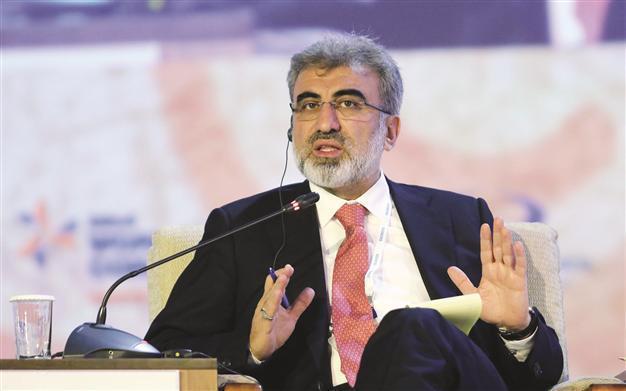Turkey eyes more Iran gas, ‘can’t cut off oil’
DAEGU - Reuters

Turkish Energy Minister Taner Yıldız speaks at a meeting during the World Energy Forum. Yıldız said Turkey cannot further cut its oil purchases from Iran. DHA photo
Turkey is importing 10 billion cubic meters (bcm) of gas a year from Iran but would buy more if it were available, Turkish Energy Minister Taner Yıldız said yesterday in a briefing during the World Energy Congress in South Korea.The country will also take at least the same 5 million tons (100,000 barrel per day) of Iranian crude in 2014 that it is taking this year, as any more cuts in the volumes from Iran would “threaten” its economy, Yıldız said.
The European Union and the United States believe Iran is developing nuclear weapons, while Tehran says its program is for power generation. Western sanctions over Iran’s nuclear program have cut its oil exports in half from pre-2012 levels and cost it billions of dollars a month in lost revenue.
“Now we are importing about 5 million tons and if we [reduce beyond] that, then that would threaten our energy supply security,” said Yıldız.
Turkey’s energy demand has doubled in the last 10 years and will double again in the next decade, he said.
Iraqi gas
Turkey is also ready to take more Iraqi gas to help meet its energy needs if Iraq increases its gas output, as well as oil and other energy sources, he said.
The U.S. in June renewed six-month waivers on Iran sanctions for Turkey and eight other economies in exchange for their agreeing to reduce purchases of oil from Iran.
This week, six world powers and Iran held two days of nuclear negotiations that the U.S. described as the most serious and candid to date. Western diplomats said Tehran hinted it was ready to scale back sensitive atomic activities to secure urgent sanctions relief.
Asked if there would be any delay in Turkey’s first nuclear power plant, the minister said there would be none, as additional upgrades for safety had been completed.
He said a planned second plant on the Black Sea could also be built as scheduled for start-up in 2023.
Earlier this month, a source close to Turkey’s nuclear plans said the first plant, being built by Russia’s Rosatom, was likely to be delayed by at least a year due to bureaucratic hurdles that are hampering the $20 billion, 4,800 megawatt project.
Turkey will host the next World Energy Congress meeting in 2016.
















